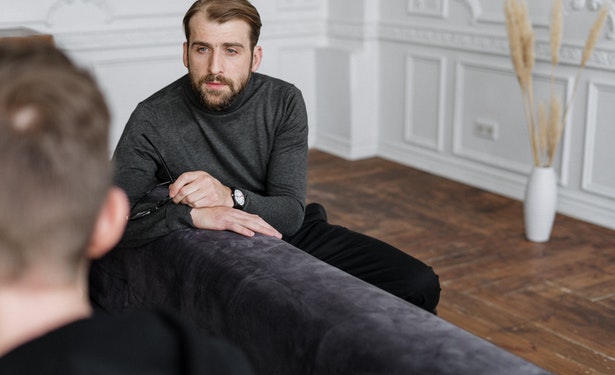Is Person-Based Talking Therapy Losing Its Appeal – and the Rise of Alternative Modalities
Date: Wednesday 16 Apr 2025
In recent years, the landscape of mental health support has undergone a seismic shift. Once considered the gold standard for emotional development, traditional talking therapy faces growing scepticism. In a recent article for Men's Health Magazine, Claudia Canavan discusses how traditional therapy is currently being talked about for all the wrong reasons. Could there be better and more easily accessible ways to bolster your mental health?
For men, who often grapple with societal expectations to suppress emotions, this evolution in mental health care presents both challenges and opportunities. As we explore why talking therapy is losing its appeal, we also uncover the potential of alternative modalities to better meet the unique needs of men seeking support.

The Decline of Traditional Talking Therapy
Talking therapy has long been a cornerstone of mental health care, but its reputation has taken a hit. Criticism over the misuse of terms like "toxic" and "narcissistic" has led to public frustration, with many feeling that therapy has become more about buzzwords than meaningful change. Health journalist Melissa Dahl’s experience, coupled with a 2023 study showing no significant difference between short- and long-term therapy for depression and anxiety, has further fueled doubts about its effectiveness.
For men, this skepticism is compounded by the perception that therapy is overly focused on emotions without offering practical solutions. As one therapist noted, men often prefer a problem-solving approach, which traditional therapy may not always provide. This disconnect can make it harder for men to engage with therapy, leaving them feeling misunderstood or unsupported.
The Rise of Alternative Modalities
In response to these challenges, many are turning to innovative therapies like Internal Family Systems (IFS) and Eye Movement Desensitization and Reprocessing (EMDR). These approaches offer a fresh perspective on healing, moving beyond the traditional "talk it out" model to address deeper, often physical, aspects of trauma and emotional distress.
- Internal Family Systems (IFS): This method views individuals as having multiple "parts" rather than a singular self. By engaging with these parts, clients can better understand and integrate their emotions, fostering self-awareness and emotional balance. For men who struggle to articulate their feelings, IFS provides a structured yet flexible framework for self-exploration.
- Eye Movement Desensitization and Reprocessing (EMDR): With a 70-90% success rate in treating PTSD, EMDR uses techniques like bilateral stimulation to help clients process traumatic memories. This approach is particularly effective for men who may find it difficult to verbalize their experiences, offering a more action-oriented path to healing.
- Somatic Experiencing Therapy: By focusing on the physical manifestations of trauma, this modality helps clients reconnect with their bodies and navigate emotional discomfort. For men, who are often conditioned to ignore physical and emotional pain, this approach can be transformative.
A Holistic Approach to Men’s Wellbeing
The rise of these alternative therapies reflects a broader trend towards holistic mental health care. Rather than focusing solely on clinical conditions like depression or anxiety, these modalities consider the interconnectedness of personal relationships, socioeconomic factors, and physical health. This comprehensive approach aligns with the mission of Brothers in Arms to support men in becoming the best versions of themselves.
For men who may feel hesitant about traditional therapy, platforms like Blethr offer a bridge to these innovative treatments. As a digital buddy, Blethr combines conversation technology with psychological principles, creating a safe space for self-exploration. By encouraging men to reflect on their experiences and emotions, Blethr helps break down the stigma surrounding mental health while promoting personal growth. You can explore Blethr here: https://bia.blethr.app/
Navigating the Evolving Mental Health Landscape
While the rise of alternative therapies is promising, it’s essential to approach this evolving landscape with caution. The unregulated nature of the therapy industry means that not all practitioners are qualified, posing risks for those seeking support. For men exploring these new modalities, verifying the credentials of therapists and seeking recommendations from trusted sources is crucial.
At Brothers in Arms, we understand that every man’s journey to mental wellbeing is unique. Whether through traditional therapy, alternative modalities, or digital tools like Blethr, the key is finding an approach that resonates with you. Remember, the effectiveness of any therapy depends on the connection between you and your therapist or support system. It’s about finding what works for you and taking that first step towards a healthier, more fulfilling life.
Final Thoughts
The decline of traditional talking therapy doesn’t signal the end of mental health support—it marks the beginning of a more diverse and inclusive approach. For men, this shift offers an opportunity to explore new pathways to healing that align with their needs and preferences. By embracing innovative therapies like IFS and EMDR, we can move towards a more holistic understanding of mental health, breaking down barriers and empowering men to take charge of their emotional wellbeing.
If you’re ready to start your journey, why not explore Blethr? It’s a great way to dip your toes into the world of mental health support in a way that feels comfortable and accessible. Let’s take that step together: https://bia.blethr.app/
You can read the full article here: https://www.menshealth.com/uk/mental-strength/a64428633/talking-therapy-is-losing-its-appeal/
Want to learn more about Blethr's digital therapy? Ask BraveheartGPT below.

